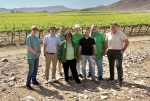By Frank Mungunda
The Youth for Green Hydrogen Scholarship Program (Y4H2) launched by the Namibian Government in collaboration with the German Federal Ministry of Education and Research (BMBF), the Southern African Science Service Centre for Climate Change and Adaptive Land Management (SASSCAL) is a groundbreaking initiative. It is strategically designed to equip young individuals with the essential skills, knowledge, and innovative capabilities required to thrive in the evolving green hydrogen economy, fostering both personal and professional development in this critical sector.
As a recipient of this scholarship, I had the privilege of engaging in a six-month research mobility program in Germany as part of my master’s degree in chemistry at the University of Namibia. This experience facilitated cross-institutional collaboration and exposed me to advanced research methodologies within the green hydrogen field. My research focused on optimizing water treatment methodologies to enhance the efficiency of hydrogen production processes a pivotal aspect of the industry’s sustainability goals.
Although establishing international green hydrogen markets has not progressed as swiftly as many had hoped one to three years ago, this situation opens opportunities for reflection and proactive strategy formulation. The complexities surrounding this delay such as the ongoing challenges in Europe, macroeconomic impacts, and unanticipated project costs can catalyse innovative solutions and strengthen political engagement.
Positive signs indicate the industry is set for growth. Numerous projects are still making headway in importing regions, and investment in the sector remains robust. For us as Namibians, this is an ideal time to conduct regular assessments of international projects and policies, examine the techno-economics of their initiatives, and focus on enhancing the skills of their workforce. By taking these constructive steps, we can effectively position ourselves to seize the emerging opportunities within the green hydrogen market.
Namibia is strategically positioned to manage a project of this nature, which is one of the compelling reasons international investors are attracted to the country. However, Namibia must strengthen its groundwork to harness such initiatives’ potential. This entails fostering the participation of as many Namibians as possible within the industry, creating well-paying employment opportunities, and ensuring that local voices are included in shaping the nation’s trajectory.
While it is acknowledged that a skills gap exists, and some may harbor reservations about the feasibility and implications of these projects, viewing them as “too good to be true,” I believe that with proactive preparation, we can realize benefits that extend far beyond the immediate endeavour. Enhancing workforce skills for the green hydrogen sector equips individuals with transferable skills that will be valuable across other emerging industries in Namibia.
Through the technical expertise in chemistry I have gained from the Y4H2 program, I am committed to contributing across the green hydrogen value chain, including roles in desalination plants and electrolyzer systems for water splitting. Beyond technical capacities, I am also dedicated to grassroots skill development through Platonic Academy Namibia, where my team is developing industry-focused curricula for academic institutions and vocational training programs. This initiative aims to prepare Namibia’s youth for higher education opportunities and bridge the existing skills gap in the green hydrogen sector, ensuring that youth are adequately prepared for higher education opportunities to address the existing skills gap within the industry. This interconnected, collaborative approach will enhance the development of high-quality skills and capacity-building initiatives.
I encourage our youth to explore their potential roles within this industry’s value chain. It is essential to seek out and comprehend relevant information and identify ways to apply that knowledge to promote our nation’s growth and personal development. As a born-again Christian, I advocate for young individuals to diligently pursue their purpose while placing their trust in God; the integration of faith and action can result in truly transformative outcomes.
Frank Mungunda is the Founding Chief Executive of Platonic Academy Namibia, an institution focused on STEM (Science, Technology, Engineering, and Mathematics). Beneficiary of the Youth for Green Hydrogen Scholarship










